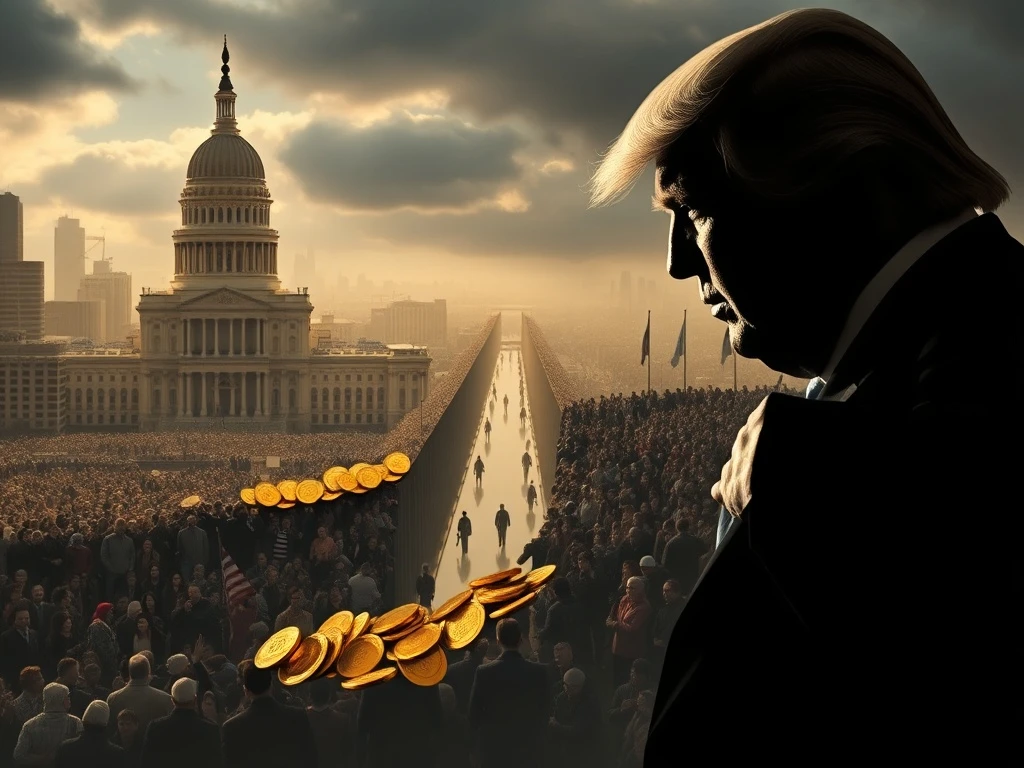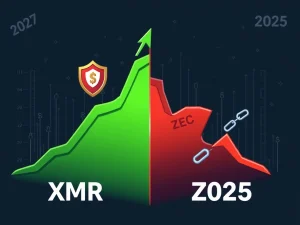Unmasking Trump’s Crypto Agenda: Is Financial Freedom an Illusion?

Are you truly gaining financial freedom, or is something more complex at play? The world of cryptocurrency often promises decentralization and empowerment for everyone. However, a critical look at the current political landscape, particularly regarding Trump crypto policy, suggests that not all agendas champion the everyday user. This article dives into the nuanced reality of how political actions might be shaping the crypto space, potentially benefiting a select few rather than the masses.
Understanding Trump’s Crypto Policy and its Promises
Donald Trump’s administration has publicly championed a crypto-friendly stance, often framing it as a move towards greater economic liberty. The narrative suggests that loosening regulations will foster innovation and provide unprecedented opportunities for individuals to participate in a new financial era. This promise of expanded financial freedom resonates deeply within the crypto community, which often views traditional financial systems with skepticism.
However, the implementation of this policy raises questions. While Bitcoin’s market performance often correlates with global market confidence, the underlying regulatory shifts seem to be creating a landscape that could be less about universal access and more about strategic consolidation. The original spirit of crypto was born from a desire to democratize finance, moving away from opaque systems that prioritized profit over people. The current trajectory, some argue, risks replicating those very systems within the digital realm.
The Reality of Crypto Deregulation: Who Benefits?
The aggressive push for crypto deregulation by the Trump administration has been a significant talking point. While deregulation can sometimes spur innovation, critics argue that in this context, it appears to serve specific interests. A notable example cited is World Liberty Financial (WLF), a crypto venture with reported ties to Trump’s sons. The launch of WLF’s stablecoin and digital tokens coincided with the administration’s efforts to relax oversight, including the disbanding of the Department of Justice’s national cryptocurrency enforcement team. This team was previously tasked with investigating money laundering and fraud within the crypto space.
This raises concerns about potential conflicts of interest. When political figures or their close associates launch crypto ventures while simultaneously influencing regulatory environments, it creates an uneven playing field. The perceived benefits of deregulation for the broader market may, in practice, be overshadowed by advantages gained by those with political connections. This shift from a truly open market to one influenced by political favoritism undermines the core principles of decentralization and fairness that cryptocurrency was built upon.
Is True Financial Freedom Elusive in This New Era?
The concept of financial freedom is at the heart of the cryptocurrency movement. It implies the ability for individuals to control their assets, transact without intermediaries, and escape the limitations of traditional banking. Yet, when politico-coins—digital tokens linked to political figures—begin to flood the market, the narrative shifts. These tokens often rally around loyalty and influence rather than technological innovation or practical utility. This phenomenon suggests a potential politicization of crypto itself, where digital assets become tools for building new forms of centralized influence rather than dismantling old ones.
The promise of financial empowerment risks being overshadowed by speculative gains and insider advantages. While entities like World Liberty Financial may thrive with new capital and reduced scrutiny, everyday investors could find themselves navigating a complex landscape designed to keep them at a disadvantage. The message inadvertently conveyed is that true financial freedom might be for sale, but only to those within specific, influential circles.
Reclaiming Blockchain Integrity: The Original Vision
The foundation of cryptocurrency lies in blockchain integrity. Bitcoin emerged as a radical experiment in financial sovereignty, designed to empower individuals and offer an alternative to the centralized, opaque systems that led to the 2008 financial crisis. The original vision was about transparency, immutability, and providing real financial access to those who were underserved by traditional finance—the unbanked, the underrepresented, and those burdened by high remittance fees or unstable local currencies.
This vision contrasts sharply with a scenario where crypto becomes another vehicle for capitalism, where power consolidates, and regulators turn a blind eye. The core mission of blockchain technology was to break the mold, not reinforce existing power structures. For crypto to truly live up to its potential, the community must remember its roots: providing tangible benefits in daily life, such as low-cost remittances or stable digital savings, rather than solely focusing on speculative investment opportunities for a privileged few.
Empowering Cryptocurrency Adoption for All, Not Just the Elite
For cryptocurrency adoption to be meaningful and widespread, it must serve the needs of the many, not just the few. This means moving beyond theoretical discussions of investment and demonstrating how crypto can solve real-world problems for ordinary people. It’s about empowering individuals to send money home without losing a significant portion to fees, or to save in stable digital currencies when their local fiat is depreciating rapidly. This practical application is where the true revolution lies.
The crypto community has a vital role to play in advocating for policies that prioritize broad financial inclusion and maintain the decentralized ethos of blockchain. It means scrutinizing agendas that talk a big game about freedom but seem to reinforce existing power dynamics. By returning to the core mission of providing genuine financial access and opportunity, crypto can truly fulfill its promise as a transformative force for global financial empowerment.
Conclusion: A Call to Action for True Financial Freedom
While the allure of political endorsement for crypto can be strong, it’s crucial to critically assess whose interests are truly being served. The narrative surrounding Trump crypto policy highlights a tension between the promise of universal financial freedom and the potential for power consolidation. For cryptocurrency to realize its revolutionary potential, it must remain committed to its founding principles: decentralization, transparency, and empowerment for every individual, not just political insiders or wealthy elites. The future of crypto hinges on the community’s collective effort to ensure that this technology genuinely breaks the mold, fostering a more equitable and accessible financial world for all.









